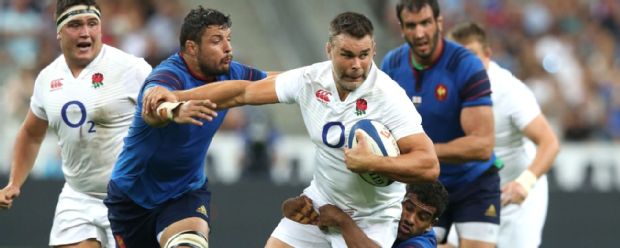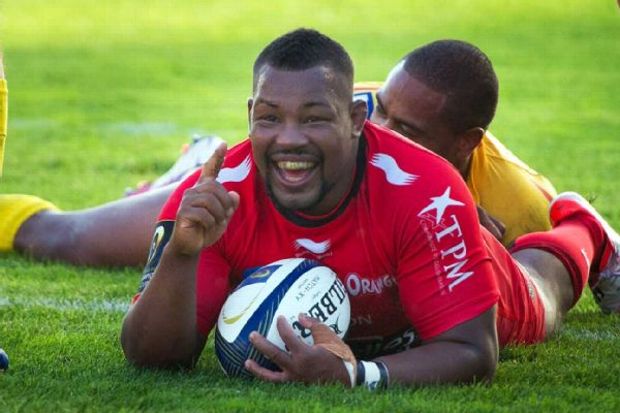|
Rugby World Cup
Monday Maul: Seven key steps that led to England's World Cup exit
Tom Hamilton
October 5, 2015
Where did it go wrong for England?
Sixteen days. That's how long England's World Cup campaign lasted before they were dispatched to infamy holding the unwanted tag as the first hosts to fail to get out of their pool. But the foundations of such a failure extend much further back. With English rugby at its lowest ebb, ESPN looks at the last four years and the steps which led to Saturday evening's nadir:
Change in approachWhen England were knocked out of the World Cup four years ago they left amid stories of ill-discipline and failed to find any rhythm during the tournament. At the time, that seemed to be a fate worse than death but -- to borrow some inspiration from the comedy TV series Blackadder -- 2015 seems like a fate worse than a fate worse than death, and that's pretty bad. Stuart Lancaster was the man handed interim control and he went about a cull of the 2011 veterans, one that later saw a remarkable volte-face when he recalled Nick Easter ahead of this World Cup. The 37-year-old Easter even came on during England's denouement against Australia. Their second-placed finish in his first Six Nations campaign got Lancaster the job on a permanent basis but how they could have done with the man who got away -- Wayne Smith. Lancaster travelled to New Zealand to try to convince the All Blacks coach to join his coaching staff but he opted to stay with the Chiefs in Super Rugby. Despite not having the Kiwi on board, much of Lancaster's vision for the refined England culture revolved around what the All Blacks had perfected: pride in the jersey, humbleness, the 'band of brothers mentality'. Lancaster's approach has been admirable, but recently it has led to accusations Lancaster treated his squad like "schoolboys". His high-minded stance also saw Dylan Hartley left out --- how England could have done with him to right their creaking set piece -- and Manu Tuilagi also fall from grace. How cruel a twist it was that a it was a sin-bin punishment -- Owen Farrell's -- that halted England's flirtation of a fightback against Australia Following England's loss in the third Test against New Zealand last summer, the players were taken straight from Hamilton to Auckland, rather than having a chance for some down time. Skipper Chris Robshaw asked Lancaster if they could go out for a drink after their win over Australia last November, but his request was rejected. The players needed a chance to unwind as a group.  © David Rogers/Getty Images
The perennial bridesmaidsChange is inevitable for England
%]Lancaster's four Six Nations tournaments have seen them finish second on every occasion, making them the nearly men. Defeats to Wales in 2012 and 2013, France in 2014 and Ireland in 2015 made them runners-up each time. All of those matches were winnable. Against southern hemisphere opposition, England beat New Zealand once (2012) and Australia twice but their tours abroad only returned one draw in South Africa alongside their two wins in Argentina in 2013. The 2014 New Zealand tour, which ended in three Test defeats, was not Lancaster's fault. The poor organisation of it years before saw England face the All Blacks a week after Northampton's triumphant Aviva Premiership final. Just 12 players who featured in the matchday squad against the Kiwis in that first Test -- a game without players from the Saints and Saracens -- were in the 31-man World Cup squad. Lancaster was hamstrung by logistics and with it a chance to build some consistency. When asked where an avoidance of such circumstance in the future would be on his list to improve England, he responded: "Top." Ritchie: We all share a sense of deep disappointment
%]
The Steffon Armitage quandaryWhile Ian Ritchie, the RFU chief executive, sat on the fence on Sunday over what will happen in the coming days regarding the future management of the England side, he did back the RFU's policy of not picking players based overseas. Hindsight is a wonderful thing but England's lack of a fetcher openside was brutally exposed against Australia, who pilfered breakdown after breakdown thanks to their double act of David Pocock and Michael Hooper. Armitage -- the two-time European Player of the Year -- has been the temptation in the shadows all along but Lancaster resisted the urge to see how the Toulon openside would fare in the England set-up for fear of the wider ramifications. Allow one through the dam of Premiership exclusivity and it would burst. The RFU has to either remove the grey area of the 'exceptional circumstance clause' -- again with hindsight surely the risk of crashing out of a home World Cup in the pool stages is such an instance to invoke that option -- or tweak the ruling like Michael Cheika did with Australia. The fact that Matt Giteau -- Armitage's club-mate -- was the man to score their final try in the drubbing at Twickenham was not lost on many there.  Steffon Armitage© AFP PHOTO/BERTRAND LANGLOIS
The Sam Burgess dilemmaHe is an inspiring individual, a great athlete but completely unproven in union. There was a sense of preordination about Burgess' inclusion in this World Cup squad. Though Gordon D'Arcy's criticism of him was unfair, Burgess' impact from the bench against Fiji and Australia was minimal -- the latter should have seen him earn a yellow card for his off-the-ball tackle on Hooper in the same incident that saw Farrell sin-binned -- and the lack of a tide-changer in the Danny Cipriani mode was exposed. That Bath have decided Burgess is a blindside, not a centre, and England persisted with him as an option in the midfield suggests general indecision over the individual. In May, Lancaster put Burgess in the hybrid mode like Australia's Hooper, which now looks a bizarre comparison. It was an avenue to explore that quickly turned into a blind alley.
Inconsistent team selection and game planEngland need consistency
%]There have been 18 different 10-12-13 combinations in the last four years -- the 18th being the trio of Farrell, Brad Barritt and Jonathan Joseph that started against Australia. Different players tried and failed to fit into the idealistic midfield mix England searched for: Luther Burrell, Joel Tomkins, Billy Twelvetrees and Kyle Eastmond all fell by the wayside. Two years ago, the prime focus was around having a playmaker inside centre and Twelvetrees fitted that bill. But against Wales they turned to Burgess and Barritt -- the ballast and the beast. Those heady days of a Matt Giteau/Matt Toomua-esque 12 seemed long gone with reports suggesting coach Andy Farrell was increasingly a dominant force in selection. There was also indecision over their premier fly-half. For so long it was George Ford who looked to be established at No.10 but then one game into the World Cup it was Farrell who usurped him. Jonny Wilkinson said you must build a fly-half's confidence and stick with him. England ignored that advice. Also top of Lancaster's agenda was the ability to match the All Blacks' kick-chase game. England's frailties under the high ball and their contestable kicking option was exposed against Ireland in this year's Six Nations defeat in Dublin, and the frequent strive to emulate what New Zealand were boasting drew criticism. The All Blacks' World Cup-winning coach Graham Henry said on Newstalk ZB: "They've been playing the wrong game for too many years. They are trying to emulate the way New Zealand play and I don't think they have the skill level to do that because they simply don't come from that sort of environment. They've changed their game in recent years and it hasn't been successful."
The hullabaloo around the World CupThough the players said they were solely focused on the tournament and spoke of their immaculate preparation for the competition, the various campaigns and hype that was attached to the team did not sit easily with the culture Lancaster was attempting to build. They were meant to be a modest, unassuming team. The big 'Wear The Rose Live' shindig at the O2 involving Take That on Sep.9 hardly fitted into that credo.  © RFU/The RFU Collection via Getty Images
The Pool of PainQuite what possessed the IRB (now called World Rugby) to make a World Cup draw based on seedings that would be three years out of date by the time of the tournament is anyone's guess. Ultimately it has cost the organisers the hosts of their tournament and with it the associated exposure the game craves. But if such a group creates the maxim "only the strongest will survive", then England have failed to meet that challenge. England just didn't perform
%]When it mattered against Wales, England panicked. Their lack of experience was exposed and the reversal of their 22-12 lead will live at the front of Lancaster's mind as he ponders where they went wrong. Just as alarming is how far off Australia they were. Lancaster's assessment is the Wallabies are about two years ahead of England at present; this was a team who last summer saw one coach leave and another arrive. Those days of England being trumpeted as one of the best ever prepared teams seem a long way off. Question marks now hover over Lancaster's future as England coach. Whether he continues or not, the RFU must keep him within the organisation -- he is an invaluable figure heading forward but was always a reluctant hero. Ritchie must also face up to his shortcomings in this whole process.
© ESPN Sports Media Ltd. Tom Hamilton is the Associate Editor of ESPNscrum.
|
Live Sports
Communication error please reload the page.
-
Football
-
Cricket
-
Rugby
-
- Days
- Hrs
- Mins
- Secs
F1 - Abu Dhabi GP
Abu Dhabi Grand Prix December 11-131. Max Verstappen ()
2. Valtteri Bottas (Mercedes)
3. Lewis Hamilton (Mercedes)
4. Alexander Albon ()
5. Lando Norris ()
6. Carlos Sainz Jr ()
-
ESPNOtherLive >>
Boxing - Nelson v Wilson; Simmons v Dickinson; Joshua v Gavern (Metro Radio Arena, Newcastle)
Golf - Houston Open
Snooker - China Open
Tennis - Miami Open

